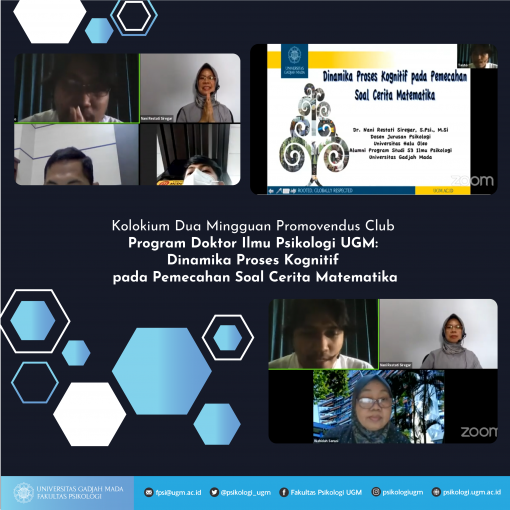
On Friday (28/5) the Promovendus Club of the UGM Psychology Doctoral Program again held an event with the topic “Cognitive Process Dynamics in Solving Math Story Problems”. The topic was presented by Dr. Nani Restati Siregar, S.Psi., M.Si who is a lecturer at Halu Oleo University, as well as an alumni of the UGM Psychology Doctoral Program. This event is part of a colloquium which is regularly held every two weeks by the Promovendus Club online.
Through the material presented, Nani explained that solving math story problems is not just doing assignments or exams. However, solving math problems is also related to the four competencies possessed by students. According to the Program of International Student Assessment (PISA), solving math story problems is related to four competencies, namely personal, social, occupational, and scientific. Therefore, learning mathematics, especially related to solving story problems, is an important thing.
If described in more detail these four competencies have their respective effects on students. First, personal competence relates to how solving math story problems trains students to solve personal problems. Second, the narrative of math story problems uses problems that are close to everyday life. This is closely related to social competence. Then, math story problems have an effect on the development of technology and informatics. It is included in the occupational competence. Finally, scientific competence is concerned with training students to not only solve problems, but also collect data that helps when conducting scientific studies.
Besides being related to competence, math story problems also involve several cognitive processes, namely working memory, inhibitory control, and shifting. Working memory is the process of marking/ignoring unimportant information. While inhibitory control is related to how to solve story problems. Students tend to spontaneously and unfiltered use problem-solving strategies that were previously when they find story questions that are similar or have been encountered before. The last, the cognitive process related to the speed with which students understand words and numbers is called shifting.
Based on research conducted by Nani, students with high working memory and shifting capacity consider math story problems to be something “ordinary”. Meanwhile, students with low working memory and only supported by inhibitory control consider math story problems as difficult questions.
